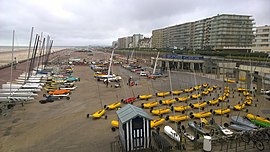Le Touquet-Paris-Plage | |
|---|---|
 Beach of Le Touquet | |
| Coordinates: 50°31′07″N 1°35′42″E / 50.5186°N 1.595000°E | |
| Country | France |
| Region | Hauts-de-France |
| Department | Pas-de-Calais |
| Arrondissement | Montreuil |
| Canton | Étaples |
| Intercommunality | CA Deux Baies en Montreuillois |
| Government | |
| • Mayor (2020–2026) | Daniel Fasquelle (LR)[1] |
Area 1 | 15.31 km2 (5.91 sq mi) |
| Demonym(s) | Touquettois (masculine) Touquettoise (feminine) |
| Time zone | UTC+01:00 (CET) |
| • Summer (DST) | UTC+02:00 (CEST) |
| INSEE/Postal code | 62826 /62520 |
| Elevation | 0–42 m (0–138 ft) (avg. 5 m or 16 ft) |
| Website | lestouquettois.fr (administrative), letouquet.com (tourism-related) |
| 1 French Land Register data, which excludes lakes, ponds, glaciers > 1 km2 (0.386 sq mi or 247 acres) and river estuaries. | |
Le Touquet-Paris-Plage (French pronunciation: [lə tukɛ paʁi plaʒ]), commonly referred to as Le Touquet (/lə tʊkeɪ/), is a commune near Étaples, in the Pas-de-Calais department, northern France. It has a permanent population of 4,213 (2021),[2] but it welcomes up to 250,000 people during the summer,[3] so the population at any given time during high season in summer swells to about 30,000.[4] Located on the Opal Coast of the English Channel at the estuary of the river Canche, the commune is one of the most renowned seaside resorts in France, with a wide range of sports and leisure activities.
The name 'Le Touquet' has been attested since the mid-18th century to designate the cape next to which the town was built. Alphonse Daloz, a public notary in Paris, then bought the land on the cape, planted a forest and built a small palace there, and in 1882 founded the seaside resort as Paris-Plage. Ten years later, John Whitley, an English businessman, saw a lucrative opportunity to build a resort for (mostly) English and French elites. His first endeavour, 'Mayville', failed as the company behind it announced bankruptcy, but on the second try, Whitley bought the coveted land and launched a construction boom in the village. This rapid expansion contributed to the government's creation of a separate commune in 1912. Numerous prestigious hotels were built, and at its peak of prosperity in the Roaring Twenties, the resort boasted the biggest casino in France by revenue, the Royal Picardy, an ultra-luxury hotel with a sparkling water swimming pool, and hundreds of villas. The bustling town had good transport connections thanks to a tram line and a narrow-gauge train line to Étaples, and, since 1936, a dedicated airport. Great Depression dealt some problems to the resort but it still remained popular with the British upper class. World War II, however, did not spare the settlement and brought destruction as the Germans deployed tens of thousands of mines and the Allies bombarded the resort in 1944. After World War II, the upper class mostly fled to the French Riviera, and property was bought up by well-off locals.
A number of unique villas still evoke the seaside architecture of the interwar period, even if most of it was lost due to destruction during World War II. 21 buildings in the commune are protected as historical monuments. Le Touquet also has extensive natural heritage protection because of its dunes and the unique nature of the Canche estuary. This, together with its initial inception as an upper-class resort, which it still is to some extent, contributes to consistently high positions in quality-of-life rankings. Today, most of its permanent population is retired. President Emmanuel Macron's spouse, Brigitte, inherited a villa in the town; therefore, the presidential couple often spends time in Le Touquet and votes there.
- ^ "Le conseil municipal du Touquet-Paris-Plage (2020-2026)". City of Touquet-Paris-Plage - Mayor's Office (in French). Retrieved 2 January 2024.
- ^ "Populations légales 2021: Recensement de la population: Régions, départements, arrondissements, cantons et communes". Insee. 28 December 2023. Retrieved 30 November 2023.
- ^ "Rapport d'observations définitives et sa réponse: commune du Touquet-Paris-Plage (Département du Pas-de-Calais)" (PDF). Cour des Comptes - Hauts-de-France. 11 April 2019.
- ^ Deldrève, Valérie (1 May 2011). "Préservation de l'environnement littoral et inégalités écologiques: L'exemple du Touquet-Paris-Plage". Espaces et sociétés. n° 144-145 (1): 173–187. doi:10.3917/esp.144.0173. ISSN 0014-0481.
{{cite journal}}:|volume=has extra text (help)


